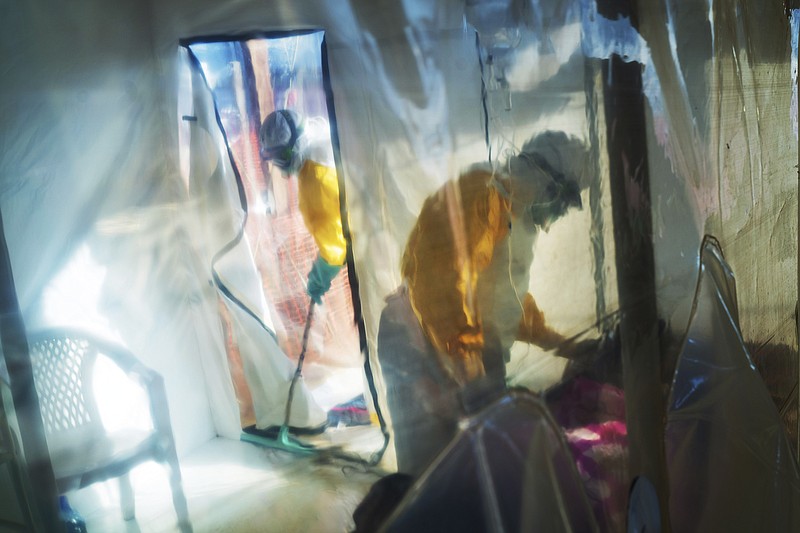DAR MANGI, Pakistan -- In Pakistan, delivering vaccines can be deadly. Militants and radical religious groups spread claims that the polio vaccine is a Western ploy to sterilize Muslim children or turn them away from religion. More than 100 health workers, vaccinators and security officials involved in polio vaccination have been killed since 2012.
The violence is an extreme example of the difficulties many poor and developing countries across Asia, Africa, the Middle East and Latin America face as they tackle the monumental task of vaccinating their populations against covid-19.
It's not just the problem of affording vaccines or being at the back of the line behind wealthy countries in receiving them.
Poor infrastructure often means roads are treacherous and electricity is sporadic for the refrigerators vital to preserving vaccines. Wars and insurgencies endanger vaccinators. Corruption can siphon away funds, and vaccination campaign planners must sometimes navigate through multiple armed factions.
"The most challenging areas ... are conflict settings, where outbreaks of violence hinder vaccinations, and areas where misinformation is circulating, which discourages community participation," said UNICEF's deputy chief of global immunization, Benjamin Schreiber.
Many nations are relying on COVAX, an international system aimed at ensuring equitable access to vaccines, though it is already short on funding.
UNICEF, which runs immunization programs worldwide, is gearing up to help procure and administer covid-19 vaccines, Schreiber told The Associated Press. It has stockpiled half a billion syringes and aims to provide 70,000 refrigerators, mostly solar powered, he said.
The agency aims to transport 850 tons of covid-19 vaccines a month next year, double its usual annual monthly rate for other vaccines, UNICEF's executive director Henrietta Fore said in a statement.
The situation can vary widely from country to country.
Mexico is expected to start immunizations soon. The military will handle distribution, and the government has promised free vaccines for Mexico's nearly 130 million inhabitants by the end of 2021.
Meanwhile, Haiti, the Western Hemisphere's poorest country, has yet to announce any vaccination plans. Health experts worry that widespread rumors could set back vaccinations -- including claims that hospitals will give fatal injections to inflate covid-19 death figures and receive more foreign aid.
The African Centers for Disease Control and Prevention is leading a continentwide effort to vaccinate Africa's 1.3 billion people in 54 countries. The agency is coordinating efforts to obtain doses and seeking World Bank help in funding -- estimating it will take $10 billion to acquire, distribute and administer the vaccines.
The aim is to vaccinate 60% of Africa's population within two years -- some 700 million people -- more than the continent has done in the past, said John Nkengasong, director of the African CDC.
"The time for action is now," said Nkengasong. "The West cannot defeat covid-19 alone. It must be defeated by all over the world, and that includes Africa."
Congo underscores the obstacles the campaign faces.
The country has overcome Ebola outbreaks with vaccination campaigns. But it struggled in eastern Congo, where Allied Democratic Forces rebels stage frequent attacks and other armed groups vie for control of mineral riches.
In Yemen, the health system has collapsed under six years of war between Houthi rebels who control the north and government-allied factions in the south.
Yemen saw its first outbreak of polio in 15 years this summer, centered in the northern province of Saada. Vaccinators haven't been able to work there the past two years, in part because of security fears, UNICEF said. Agencies rushed to give new inoculations in parts of the north and south in November and December.
No plans for covid-19 vaccinations have been announced yet, whether by the Houthis, southern authorities or WHO and UNICEF.
In Pakistan, public distrust was fueled when the CIA in 2011 used a scam vaccination program to identify the hideout of al-Qaida leader Osama bin Laden, leading to the special forces raid that killed him.
Pakistan, Afghanistan and Nigeria are the only countries in the world where polio is still endemic. There have been 82 new polio cases this year alone, largely because vaccinations were suspended due to the pandemic, said Dr. Rana Safdar, who coordinates the polio vaccination campaigns.
Information for this article was contributed by Samy Magdy, Maria Verza, Sonia Perez D., Evens Sanon and Al-Hadji Kudra Maliro of The Associated Press.




